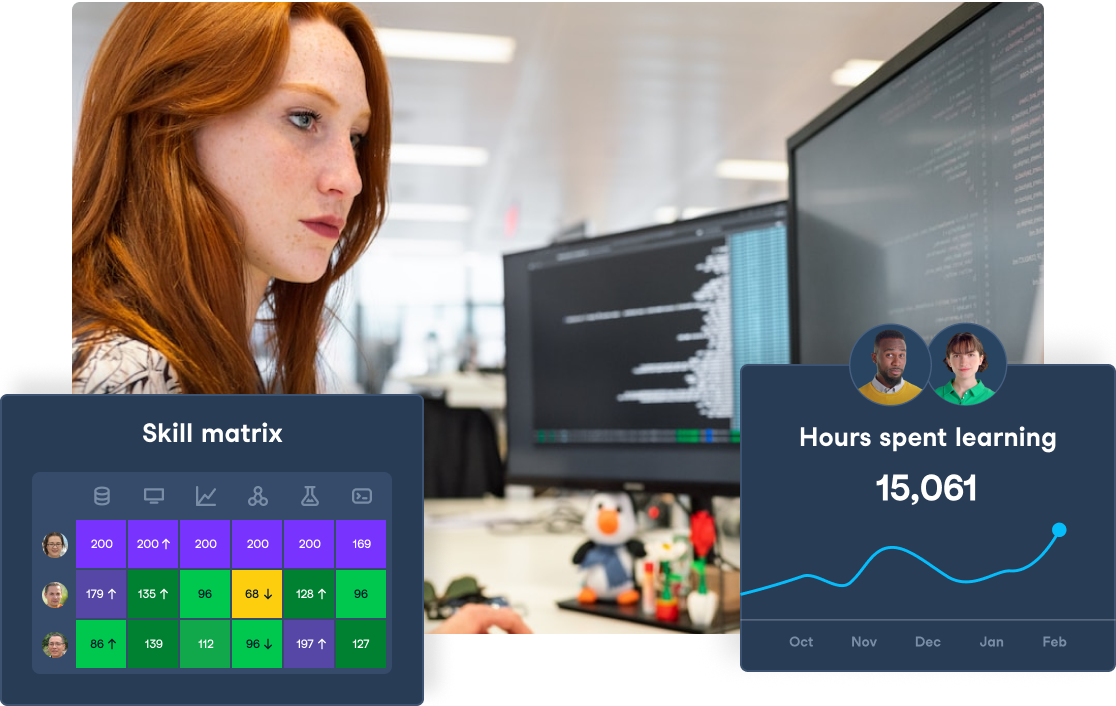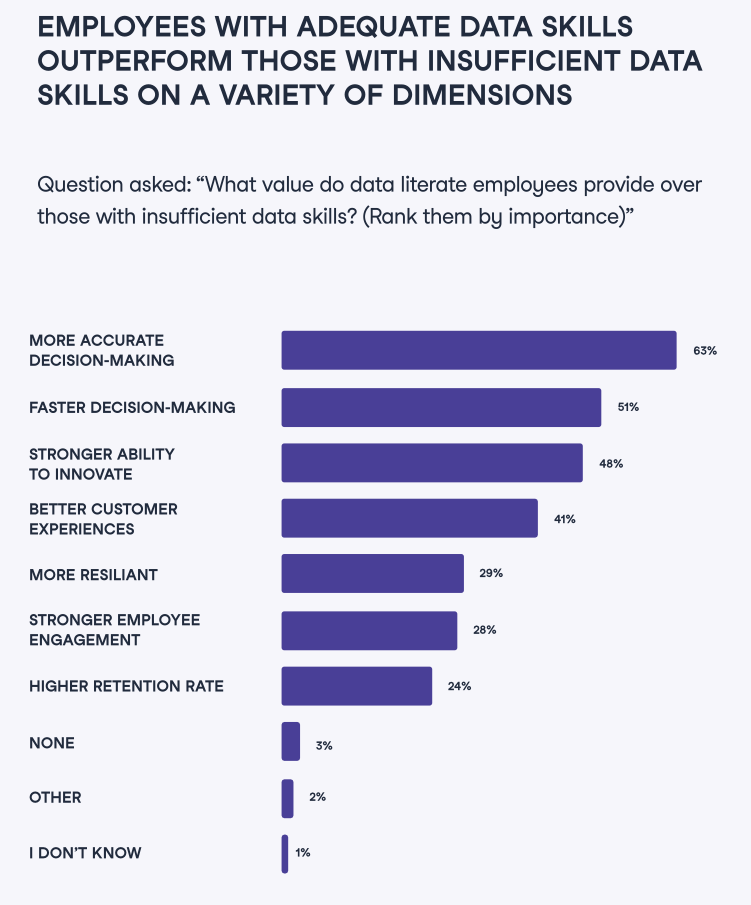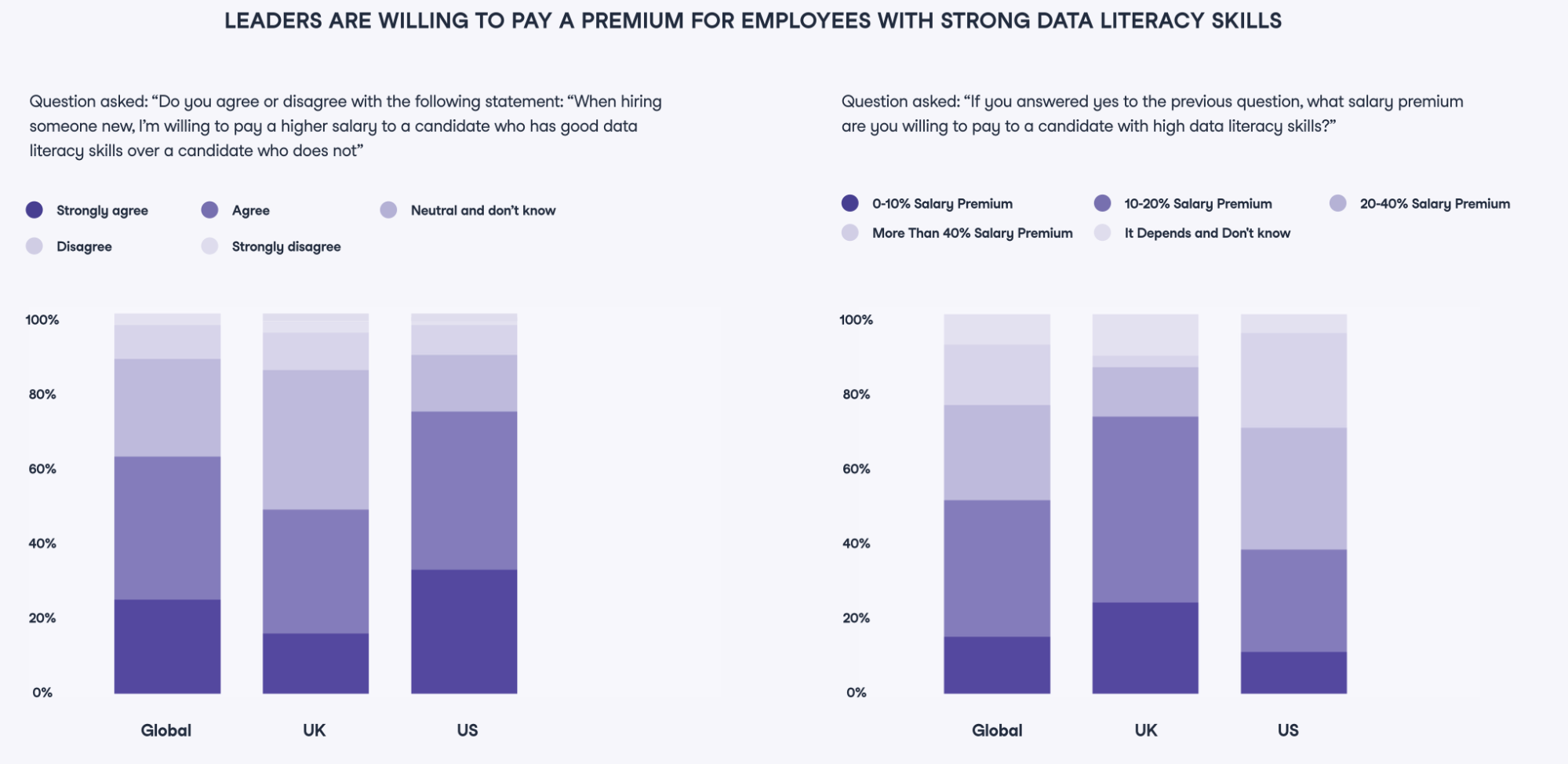Track
Data literacy has become a crucial skill for both individuals and organizations to make well-informed decisions. For professionals in most industries, upskilling in data not only enhances your career prospects but also allows you to thrive in the workplace. In this blog post, we will use findings from The State of Data Literacy Report 2023 to explore the increasing importance of data skills for individuals, their impact on career growth, and how they can help you navigate the challenges of the modern workforce. You can learn more about Getting ROI From Your Data Literacy Program in our separate webinar.
Empower Your Team with Data Literacy
Enhance your team's data literacy and decision-making capabilities with DataCamp for Business. Access diverse courses, hands-on projects, and centralized insights for teams of 2 or more.

The Rise of Data Skills in the Workforce
The State of Data Literacy Report showed that 89% of UK business leaders and 78% of US business leaders consider basic data literacy skills among the most important skill sets for their employees' daily tasks.
Furthermore, three of the top five fastest-growing skill sets in the UK and the US are data skills, spanning business intelligence, data science, and basic data literacy skills.
This increased demand for data skills is driven by the need for organizations to make data-driven decisions, innovate, create better customer experiences, and adapt to a constantly changing business landscape.
All of these factors culminate in the fact that 74% of respondents agreed or strongly agreed that employees with data literacy skills outperformed those with inadequate data skills. Data skills are clearly essential in today’s job market.

Upskilling in Data: A Competitive Advantage
As an individual, upskilling in data can give you a competitive advantage in your career. With the increasing demand for data skills, the professionals who invest time in learning and developing these abilities will stand out in the job market. By acquiring data skills, you can improve your decision-making, problem-solving, and critical-thinking abilities, making you a valuable asset to any organization.
The Impact of Data Skills on Career Growth
Data from the US Bureau of Labor Statistics shows that roles such as data scientist, information security analyst, and statistician all feature in the top 10 fastest-growing occupations in the US. As a result, individuals with data skills could experience significant career growth.
This data is backed up by findings from our own report. Nearly 75% of respondents to The State of Data Literacy Report agreed that those with data literacy skills outperformed those with inadequate data skills. Leaders pointed to more accurate decision-making, a stronger ability to innovate, and the ability to create better customer experiences as some of the main values data-literate employees bring to the table.
Furthermore, those surveyed felt that companies with employees who possess the necessary data skills exhibit gains in innovation, faster and more informed decision-making, better customer experiences, and more. Leaders also view data skills as a potential safeguard against their biggest challenges in the upcoming decade, including economic uncertainty, misinformation, and increased disruption of their industries.
These factors suggest that those with the right data skills could experience a career boost compared to those without data literacy. We’ll explore the positive impacts in more detail further on.

Data Skills and Personal Resilience in a Challenging Job Market
The impact of data skills reaches beyond individual organizations, potentially addressing key societal challenges such as AI-powered misinformation. For example, in The State of Data Literacy Report, 67% of data and business leaders believed that organizations investing in data upskilling are more likely to be recession-proof.
This indicates that individuals who upskill in data can improve their personal resilience in a challenging job market and increase their employability while also delivering success in the organizations they work for.
Closing the Data Literacy Skills Gap
More than half of the leaders surveyed stated that their organization has a data literacy skill gap that needs to be addressed. As an individual, investing time and effort in upskilling your data literacy skills can help you bridge this gap and enhance your career prospects.
The catalysts behind this skill gap include the speed of data proliferation, the slow-moving nature of change management, and the need for continuous upskilling. Find out more about how organizations can overcome the challenges in data upskilling in a separate article.
The Benefits of Upskilling in Data for Individuals
So why is it important for you to become data literate? Well, upskilling in data can provide numerous benefits, including:
- Increased employability. As data skills become more sought after, those with these abilities will find it easier to secure jobs in their desired fields and industries.
- Higher salary potential. With 66% of leaders stating that they are willing to pay a higher salary to a candidate with good data literacy skills, upskilling in data can lead to higher salaries and better compensation packages.
- Broader career opportunities. Data skills are applicable across various industries and job roles, providing you with diverse career options and the flexibility to explore different paths.
- Improved decision-making. Data literacy enhances your ability to make well-informed decisions by analyzing and interpreting data, which is invaluable in any professional setting.
- Enhanced problem-solving. With data skills, you can identify patterns, trends, and insights that help you solve complex problems more effectively and efficiently.
- Greater adaptability. As organizations face disruptions and changes in their industries, employees with data skills can quickly adapt and stay ahead of the curve.
How to Upskill in Data: A Roadmap for Success
Now that we understand the importance of upskilling in data for your career, it's crucial to devise a plan to acquire and develop these skills. Here are some steps to help you get started:
- Identify your learning goals. Determine the specific data skills you want to learn, whether it's basic data literacy, data analysis, data visualization, or more advanced skills like machine learning and data engineering.
- Choose the right resources. Select learning resources that align with your goals and preferred learning style, such as online courses, data certifications, workshops and webinars, books, or mentorship programs.
- Create a learning schedule. Set aside dedicated time for learning and practice, and establish short-term milestones and long-term goals to track your progress.
- Apply your skills to real-world projects. Put your newly acquired data skills into practice through personal projects or by volunteering for data-driven initiatives at your workplace.
- Network with other data professionals. Attend industry events, join online forums, and connect with other professionals to learn from their experiences and stay updated on the latest trends in data science.
- Continuously update your skills. As the field of data science evolves rapidly, it's essential to stay updated with the latest tools, techniques, and advancements to maintain your competitive edge in the job market.
Conclusion
In today's fast-paced, data-driven world, upskilling in data has become essential for career success. By developing data literacy skills, you can improve your employability, increase your salary potential, and make yourself an invaluable asset to any organization. With a strategic roadmap for learning and continuous skill development, you can pave your way toward a successful career in the data era.
Training 2 or more people?

A senior editor in the AI and edtech space. Committed to exploring data and AI trends.

